Published Feb 11, 2015
Brief Encounters of the Trekster Kind
Brief Encounters of the Trekster Kind
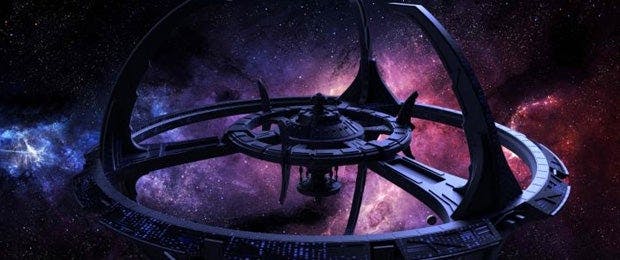
No matter what you or I do, we can’t meet them all. It’s just unrealistic. Impossible. Undoable. Star Trek is a 50-year phenomena with literally hundreds of actors, writers, directors, producers, special FX creators, artists and technicians.
Meet ’em all? You would have had to start really early—say September or October 1966—just to catch those folks who died long before Trek conventions took off (like Theo Marcuse, Jeffrey Hunter, Gene L. Coon, Janos Prohaska, etc.). Now, although all too many Trek celebrities are gone, there are still opportunities to rendezvous with several starships full. For instance, Creation Entertainment’s 2014 Official Star Trek Convention brought more than 100 celeb guests to Sin City—a daunting number. Nonetheless, if you had the wherewithal, you could line up and meet them all.
That’s more patience than I’ll ever have (unless I can bring a book to read in line or rely on old friends to be on hand for chitchat). Luckily, I’ve already met a number of these people at press events and past SF conventions (costume contests, dinners, behind the scenes)—the source of my odd encounters with famous folks recounted in various Starlogging essays.
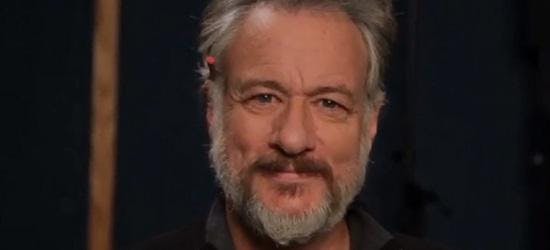
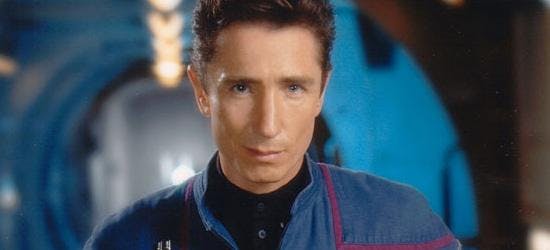
Others were brief. Short subjects. For example, I met two Enterprise stars the very same day at one convention. I shook Dominic (Malcolm Reed) Keating’s hand and, later that afternoon, Connor ("Trip" Tucker) Trinneer’s—and I handily told them both the very same thing: "Thanks for talking to Starlog’s writers." You see, whenever I ran into some celeb we had previously interviewed, I would then name-check whomever had talked to them: Tom Weaver, Bill Warren, Will Murray, Kim Howard Johnson, Bill Florence, Mark Phillips, Ian Spelling, Joe Nazzaro, Lynne Stephens, Jean Airey, Bob Greenberger, Marc Shapiro, Pat Jankiewicz, Bob Miller, Jami Bernard, Lee Goldberg, Bill Rabkin, Brian Lowry, the late Steve Swires, the late Kyle Counts, etc., etc. Dramatic pause after naming the writer. "I really appreciate it," I’d conclude.
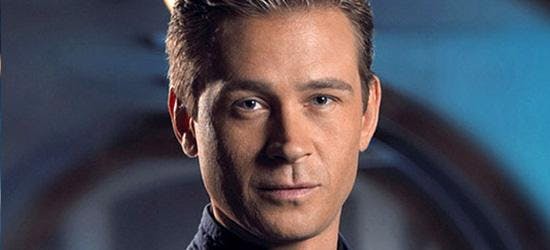
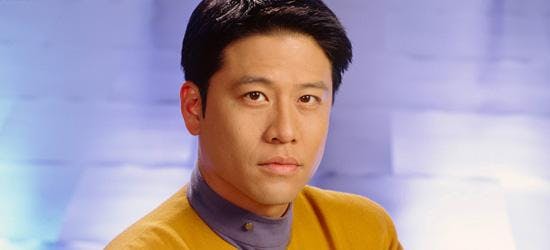
At other cons, I ran into Garrett Wang (Star Trek: Voyager’s Harry Kim) in passing and did that standard "Thank you" line. And I met Robert Duncan McNeill (Voyager’s Tom Paris) moments before he went on stage for an audience Q&A. Same gratitude deal. I even thanked him for talking to Marc Shapiro for my Masters of the Universe licensed movie magazine back in 1987 (McNeill was the young hero assisting He-Man in that mediocre flick). These were equally brief encounters (and the totality of my time with Wang and McNeill). And you know, standing in an autograph line for any one of these Trek celebs, you can probably do better than me.
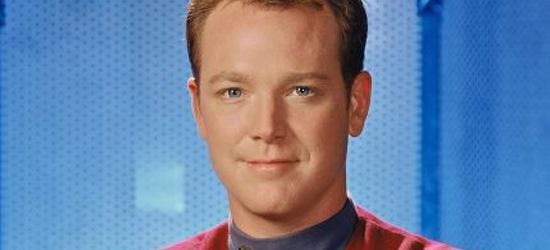
Here’s how: Think of something other than Star Trek to talk about when it’s your turn to interact. After all, you’re (probably) at a Trek con, so it’s already understood that (almost certainly) you’re a Trek fan. Mention something else instead! And, by the way, do that only if you truly, honestly, really have something to say about that other thing. For instance, I enjoyed chatting with John (Q) de Lancie about Legend (I’m a fan of that cult TV show co-starring de Lancie and Richard Anderson, co-created by veteran Trek writer-producer Michael Piller) and with Rene (Odo) Auberjonois about portraying Father Mulcahy in the amazing, Robert Altman-directed 1970 movie M*A*S*H. And TOS guest William Windom (Commodore Decker of "The Doomsday Machine") seemed to appreciate what I said when I met him (as recounted in another Starlogging essay). I told Windom that I had especially loved him in a well-regarded Night Gallery episode and on stage in his one-man play Thurber. It can’t (and perhaps shouldn’t) all be about Star Trek.
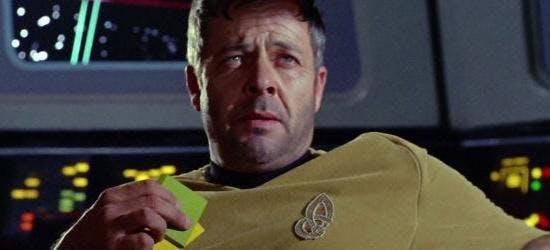
Hey, I even have non-Trek examples from other locales. Interviewing filmmaker Brad Bird at Pixar Animation Studios in Oakland, California three months before the 2004 release of The Incredibles, I couldn’t stop myself from blithering about how much I liked his previous animated masterwork, The Iron Giant. Hey, if I ran into Bird today, I’d be blathering on about how much I’m looking forward to his live-action SF film Tomorrowland! Chatting with director Simon Wincer on the set of The Phantom on Australia’s Gold Coast in 1996, I found myself thanking him "on behalf of Western fans everywhere" (yes, I really said that pretentious schmaltz, but I meant it) for helming the pioneering, original Lonesome Dove TV mini-series. When I met writer-director W.D. Richter at a Boston media appearance in 1991, I didn’t ask about his new film (Late for Dinner) but about his past cult movie, one of my faves, The Adventures of Buckaroo Banzai: Across the Eighth Dimension. Remember, "no matter where you go, there you are!"
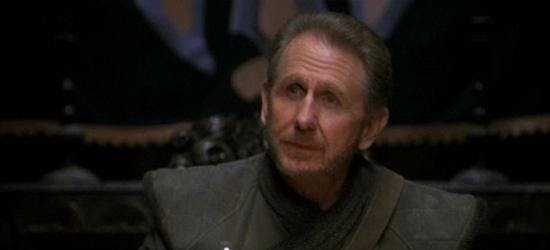
I met Nana Visitor (Star Trek: Deep Space Nine’s Major Kira) after she left the stage at another con and thanked her (per SOP, Starlog Operating Procedure). Now, I could have yammered about seeing Visitor on Broadway a dozen years before (in the My One & Only musical with Tommy Tune and Twiggy) or her role as Ellen Dolan in the unsold 1987 TV movie pilot adaptation of Will Eisner’s iconic comic The Spirit. But, I didn’t. I also knew of Visitor’s then off-the-record romance with co-star Alexander Siddig (DS9’s Dr. Julian Bashir). Didn’t mention that, either.
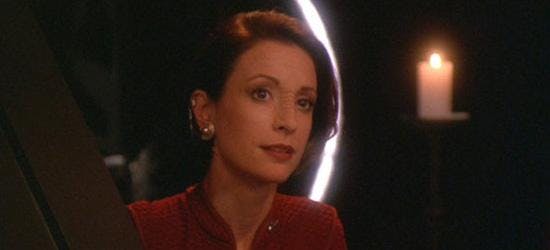
Here’s a chance to explain why while blither-blathering a bit on the subject. Namely, what I thought is fair to chronicle about SF celebrities’ lives, what’s journalistically viable and what’s off-limits (or irrelevant). Some supermarket tabloids and gossipy websites consider nothing out-of-bounds; they even (allegedly) manufacture "news" stories. Other outlets (like People Magazine, Entertainment Tonight and Access Hollywood) indulge in high-end celebrity journalism—they don’t report anything too salacious, nothing that might frighten small children, domesticated animals and the elderly. Now, despite practicing entertainment journalism, there were areas of our subjects’ lives (their families, love life, religion, politics, race, sexuality, etc.) that Starlog just didn’t explore—unless the interviewee voluntarily brought the topic up first (and that happened only infrequently). Otherwise, shouldn’t we (Starlog’s editors, writers and readers) all just be minding our own damned business?
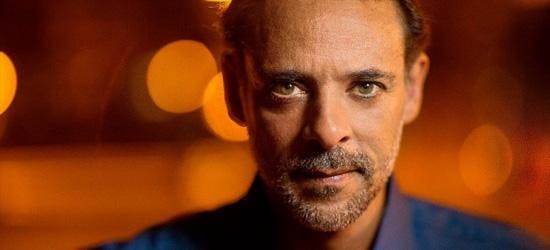
Weird Anecdote Time: At one point, I was strongly advised to add a "sci-fi gossip" page to Starlog in hopes of increasing sales. This presented a real dilemma. I could envision how a sample page of gossipy "blind items" might go: "Which nubile actress nabbed a high-profile star by having an envelope containing her phone number and nude photo delivered to his hotel room? Which thespian bizarrely boasted to acquaintances about never smoking cigarettes while recently, secretly puffing away? Which filmmaker asked his wife for a divorce—on her birthday? Which producer found inspiration for his pictures by skimming old SF magazine stories?"
Tantalizing stuff, eh? And all true—if decades-old. So, it was a devilish temptation to unveil a gossip column (intended to be staff-written, under a pseudonym), but after some consideration and debate with my Managing Editors, the Jiminy Cricket consciences of my life, I demurred, pocket vetoing the tawdry idea. Note: Disingenuously, hypocritically, that hasn’t stopped me from retailing those ancient blind items last graph, even if all are long past their newsy, sell-by dates. Didja notice that? I’m ambivalent about the topic to this day. Was I wrong to reject the gossip gig? I dunno. Maybe Starlog, Comics Scene and Sci-Fi TV would have sold better overall if I had just been a tad more flexible about tricky situations like this one.
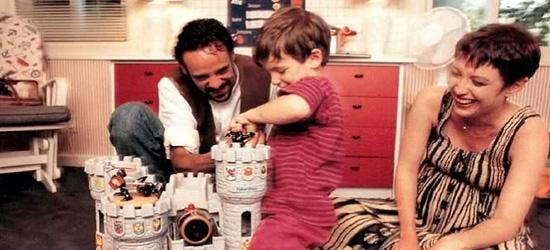
Anyhow, that’s why we never reported the Visitor-Siddig relationship until one of them chose to reveal it in an interview. If you don’t know, it’s a matter of public record that they married, had a son named Django and eventually divorced in 2001. Until they disclosed the news, though, it’s none of our business!
So, there were no references to all that jazz when I met Siddig months later. I did that line again, that one I told you about. Siddig was holed up in his hotel room between convention appearance duties, he explained, furiously working on his "shot list" (the angles and set-ups he planned to lense for various scenes when directing an upcoming DS9 episode). I was secretly pleased that others brought homework with them to conventions because it’s something I always did. But that was our brief meeting, one prompting great admiration from me for his professionalism.
For about six consecutive years, I spent Thanksgiving Weekend in Indianapolis at the fan-run Starbase Indy con. Like Siddig, when I wasn’t on stage or chatting with fans, I was barricaded in my room with my own shot list, trying to edit 10 lengthy articles in one weekend (have I noted that I was always behind thanks to a massive, multi-magazine editorial workload?). One year at Starbase Indy, between convention stuff and editing marathons, I didn’t run into a fellow guest until Sunday evening after the con was over. There, as I exited the Indianapolis Marriott restaurant, sat comedian-actor Christopher Collins (a.k.a. Chris Latta) dining all alone.
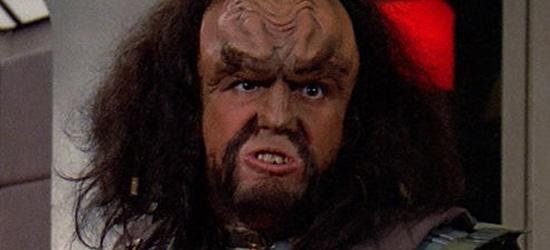
So, I ambled over, introduced myself and stood there chatting with Collins, best known among Trekkers for playing Captain Grebnedlog who tries to trap Enterprise engineer Geordi La Forge in a "Samaritan Snare" and shanghai him into Pakled ship servitude. I know now that it’s not a much-loved second season Next Generation episode, but I didn’t realize that then (and, in any event, I like "Samaritan Snare"). I wasn’t really tuned in to certain cartoons so I was also blissfully unaware of the importance of Collins’ voiceover work in Transformers (as Starscream) and G.I. Joe (as the ubervillain Cobra Commander, a character of whom even I had heard).
As I stood there, Collins revealed that he had abandoned two other notable animation roles: Moe the bartender (where he was replaced by Mad About You actor Hank Azaria) and Springfield zillionaire C. Montgomery Burns (succeeded by Harry Shearer, the multi-talented actor-writer-director-radio show host who I met in 1998). Collins told me then that he hadn’t thought The Simpsons was going to go anywhere, so he dropped out of the show early on after only recording a few episodes. His "error of comedies" was, frankly, hard to believe, but was apparently true. Talking to me that November Sunday, Collins was grimly sardonic about the situation, knowing even then that greater fame and (eventually) unprecedented millions would go to Azaria, Shearer and their Simpsons vocal co-stars. It was his real regret.
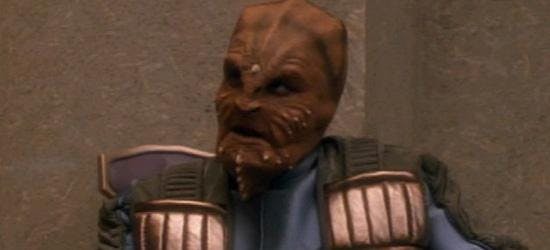
I couldn’t thank Collins with that familiar line—you know the one—because we hadn’t yet interviewed him. He gave me his contact information and we agreed that sometime next year a Starlog writer would call. And then goodbye and Merry Christmas. Another brief (albeit longer) encounter was over, soon followed by a regret of my own because (of course) we didn’t get around to calling. Now, memory plays tricks. Mine assured me that I had opened the Hollywood trade paper Variety just a week later in December and discovered the unexpected, sad news about Christopher Collins. No. That’s not what really happened. In checking up on the history of events, I know it was actually seven months later, June 1994. That’s when his obituary was published.
David McDonnell, "the maitre’d of the science fiction universe," has dished up coverage of pop culture for more than three decades. Beginning his professional career in 1975 with the weekly "Media Report" news column in The Comic Buyers’ Guide, he joined Jim Steranko’s Mediascene Prevue in 1980. After 31 months as Starlog’s Managing Editor (beginning in October 1982), he became that pioneering SF magazine’s longtime Editor (1985-2009). He also served as Editor of its sister publications Comics Scene, Fangoria and Fantasy Worlds. At the same time, he edited numerous licensed movie one-shots (Star Trek and James Bond films, Aliens, Willow, etc.) and three ongoing official magazine series devoted to Trek TV sagas (The Next Generation, Deep Space Nine, Voyager). He apparently still holds this galaxy’s record for editing more magazine pieces about Star Trek in total than any other individual, human or alien.
Copyright 2015 David McDonnell

